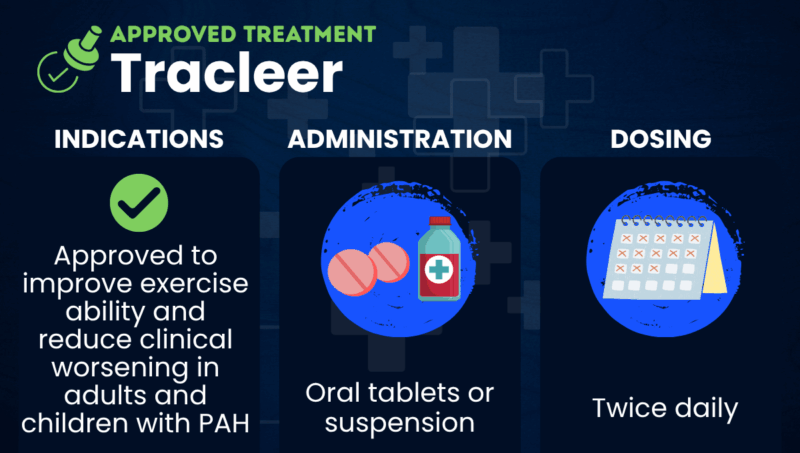Tracleer (bosentan) for pulmonary arterial hypertension
What is Tracleer for pulmonary arterial hypertension?
Tracleer (bosentan) is an oral medication approved to improve exercise ability and reduce clinical worsening in adults and certain children with pulmonary arterial hypertension (PAH).
In PAH, the blood vessels in the lungs narrow, causing pressure in them to rise. The heart consequently has a harder time pumping blood through the lungs, limiting oxygen transport in the body and making physical activity difficult.
Tracleer is an endothelin receptor antagonist that prevents the binding of endothelin — a protein that’s elevated in PAH and causes blood vessels to narrow — to the receptors through which it exerts its effects. By blocking these signals, Tracleer helps the blood vessels in the lungs widen, lowering pressure and improving blood flow to ease PAH symptoms.
Taken as tablets, Tracleer was developed by Actelion Pharmaceuticals, now part of Johnson & Johnson. Generic versions are also available in the U.S.
Therapy snapshot
| Brand name | Tracleer |
| Chemical name | Bosentan |
| Usage | Used to improve exercise ability and reduce clinical worsening in people with PAH |
| Administration | Oral tablets or suspension |
Who can take Tracleer?
Tracleer is approved in the U.S. to:
- improve exercise ability and decrease clinical worsening in adults with PAH
- improve pulmonary vascular resistance (PVR) — a measure of the resistance that must be overcome for blood to flow through the lungs — in children with idiopathic or congenital PAH, 3 years and older. This is expected to result in an improved ability to exercise.
The medication is also widely approved in other countries. In the European Union, it is approved for certain adults and children, 1 year and older, with PAH.
Tracleer is available in the U.S. only through a restricted access program because it is associated with a risk of serious health outcomes. It comes with a boxed warning that it could cause:
- liver toxicity
- birth defects if used during pregnancy.
The treatment is contraindicated, or should not be used, in patients who:
- are pregnant
- are taking cyclosporine A, an immunosuppressant
- are taking glyburide, a medication for type 2 diabetes
- have a history of hypersensitivity (severe allergic reaction) to bosentan or any of the ingredients in Tracleer.
How is Tracleer administered?
Tracleer is taken orally, twice per day, with or without food. The medication is available as film-coated tablets that are swallowed whole or dispersible tablets that can be dissolved in water immediately before administration for an oral suspension formulation.
- For adults and adolescents older than 12, the recommended starting dose is 62.5 mg twice daily for the first month. Thereafter, the dose is doubled (125 mg twice daily) for patients who weigh more than 40 kg (about 88 pounds).
- Children 12 and younger receive a weight-based dose of Tracleer, ranging from 16 to 64 mg, twice daily.
Dose adjustments may be needed in people with elevations in liver enzymes or who are using the antiretroviral medication ritonavir.

Tracleer in clinical trials
Tracleer’s approvals for PAH patients were supported by data from a number of clinical trials.
- The BREATHE-1 and Study 351 trials supported Tracleer’s approval for people with severe PAH (World Health Organization functional class III and IV). In both studies, patients treated with Tracleer on top of their standard therapy regimen showed significant improvements in their ability to exercise and a lower rate of clinical worsening compared with standard treatment alone.
- The Phase 3 EARLY trial (NCT00091715) supported Tracleer’s approval for mildly symptomatic PAH patients (WHO functional class II). In that study, Tracleer led to significant reductions in PVR and a delay in the time to clinical worsening relative to a placebo among PAH patients 12 and older. A trend toward improvements in exercise capacity was also observed.
- A small open-label study called BREATHE-3 supported Tracleer’s approval for children. It demonstrated that treatment with Tracleer oral tablets led to similar improvements in PVR for children as it did in adults.
A series of Phase 3 trials called FUTURE-1 (NCT00319267), FUTURE-2 (NCT00319020), and FUTURE-3 (NCT01338415) then tested the dispersible tablet formulation of Tracleer in children with PAH, generally showing the therapy had an acceptable risk/benefit profile and good long-term safety and efficacy.
Tracleer side effects
The most common side effects reported with Tracleer include:
- respiratory tract infections
- low red blood cell counts, or anemia (with film-coated tablets)
- fever (with dispersible tablets).
The boxed warning for Tracleer states the medication may cause serious liver damage or failure. Liver enzymes will be regularly monitored, and the medication should be discontinued if liver enzyme elevations are accompanied by signs or symptoms of liver dysfunction or injury.
Animal data suggest Tracleer is likely to cause major birth defects if used during pregnancy. According to the boxed warning, pregnancy must be excluded before and during treatment. Females of reproductive potential should use two reliable forms of contraception during treatment and for at least one month after their last dose. Hormonal contraceptives should not be used as the sole means of contraception because Tracleer may reduce their effectiveness.
Other uncommon but serious side effects that may occur with Tracleer include:
- swelling or fluid retention
- reduced sperm counts.
If fluid buildup in the lungs occurs, it could be a sign of pulmonary veno-occlusive disease, a rare cause of PAH. In such cases, Tracleer may have to be discontinued.
Pulmonary Hypertension News is strictly a news and information website about the disease. It does not provide medical advice, diagnosis, or treatment. This content is not intended to be a substitute for professional medical advice, diagnosis, or treatment. Always seek the advice of your physician or other qualified health provider with any questions you may have regarding a medical condition. Never disregard professional medical advice or delay in seeking it because of something you have read on this website.

 Fact-checked by
Fact-checked by 


